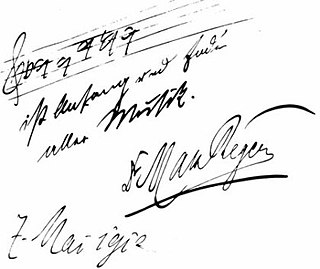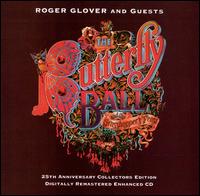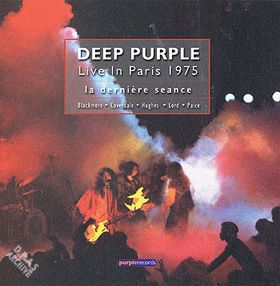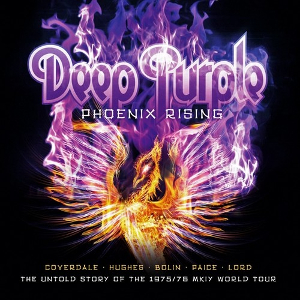
In music, the BACH motif is the motif, a succession of notes important or characteristic to a piece, B flat, A, C, B natural. In German musical nomenclature, in which the note B natural is named H and the B flat named B, it forms Johann Sebastian Bach's family name. One of the most frequently occurring examples of a musical cryptogram, the motif has been used by countless composers, especially after the Bach Revival in the first half of the 19th century.

John Douglas Lord was an English keyboardist and composer. In 1968, Lord co-founded the hard rock band Deep Purple, and he became regarded as its leader in the early years. Lord performed on most of the band's most popular songs; he and drummer Ian Paice were the only continuous members in the band between 1968 and 1976, and also from when it was re-established in 1984 until Lord's retirement in 2002. He also spent time in the bands Whitesnake, Paice Ashton Lord, the Artwoods, the Flower Pot Men and Santa Barbara Machine Head.

Deepest Purple: The Very Best of Deep Purple is a compilation album by the English hard rock band Deep Purple, released in 1980 on LP. It features the original hits of Deep Purple before their 1984 reunion. Aided by a TV advertising campaign it would become Purple's third UK No. 1 album. In 1984 this compilation additionally was published on CD.

Come Taste the Band is the tenth studio album by English rock band Deep Purple, released on 7 November 1975. It was co-produced and engineered by the band and longtime associate Martin Birch. Musically, the record consists of stronger influences of funk than the previous band's albums.

Last Concert in Japan is an album by Deep Purple released in March 1977 in Japan and in 1978 in Europe. Dedicated to Tommy Bolin, it records the last Japanese concert of the Mark IV-lineup that included Bolin. It was recorded on 15 December 1975 at the Tokyo Budokan and achieved gold certification in Japan.

The Butterfly Ball and the Grasshopper's Feast is a concept album and subsequent live rock opera written by Roger Glover. It appeared in 1974 and 1975 respectively, and was based on the children's poem of a similar title. The album cover design is from Alan Aldridge's design for a 1973 book based on the poem.
Eberhard Schoener is a German musician, composer, conductor, and arranger. His activities combine many styles and formats. Originally a classical violinist and conductor of chamber music and opera, he was one of the early adopters and popularizers of the Moog synthesizer in Europe. In the 1970s he traveled to Indonesia and incorporated musical elements from Asia into his own work. He has collaborated with rock musicians such as Jon Lord and The Police and also with Electronic Music German Pioneer band Tangerine Dream on an orchestral arrangement for the "Mojave Plan" track for a live performance on a German TV show. He has composed film scores, videos, music for television, and an opera to be broadcast via the Internet. He has won numerous awards, including the 1975 Schwabing Art Prize for music, the 1992 Bambi Award for creativity and a lifetime achievement award at the Soundtrack Cologne Festival of Music and Sound in Film and the Media in November 2014.

Edward Anthony Ashton was an English rock pianist, keyboardist, singer, composer, producer and artist.

Days May Come and Days May Go is a compilation album by the English hard rock band Deep Purple, released in 2000.

The Anthology is a compilation album by the English hard rock band Deep Purple, containing material by Mks I (1968–1969), II (1969–1973), III (1973–1975) and IV (1975–1976) line-ups. It was released as a double vinyl album and double-cassette, and included a few previously unreleased tracks and mixes. The sleeve-notes were written by Chris Charlesworth, author of Deep Purple – The Illustrated Biography.

California Jamming is a live album by English hard rock band Deep Purple, recorded in 1974 and originally released in 1996, it was re-released as a remastered edition in 2003 with the complete concert including the missing track "Lay Down, Stay Down".

"Burn" is a song by English rock band Deep Purple. It was released on the album of the same name in 1974. In the US and Japan it was also released as the second single by the Mark III lineup, after "Might Just Take Your Life".

Live in Paris 1975 is a live album by the English hard rock band Deep Purple, recorded in 1975 at the Palais des Sports in Paris. It was meant to be released before the 1975 Come Taste the Band album, but was not released until 2001 by Purple Records.

Sarabande is the second solo album by Jon Lord recorded in September 1975 near Düsseldorf (Germany). The orchestra Philharmonia Hungarica was conducted by Eberhard Schoener.

Before I Forget is a 1982 album by Jon Lord, featuring a largely conventional eight-song line-up, no orchestra. The bulk of the songs are either mainstream rock tracks or, specifically on Side Two, a series of very English classical piano ballads sung by mother and daughter duo, Vicki Brown and Sam Brown and vocalist Elmer Gantry. The album also features prolific session drummer Simon Phillips, Cozy Powell, Neil Murray, Simon Kirke, Boz Burrell and Mick Ralphs. Lord used synthesizers more than before, principally to retain an intimacy with the material and to create a jam atmosphere with old friends like Tony Ashton.

Smoke on the Water & Other Hits is a compilation album by the English rock band Deep Purple, released in 2001.

After the 1969 classical / rock fusion Concerto for Group and Orchestra, Jon Lord was commissioned to write a follow-up. This was Gemini Suite, five long movements inspired by the members of Deep Purple, and performed live in September 1970 at the Royal Festival Hall with The Light Music Society Orchestra. Jon Lord then recorded it in the studio as his first solo project in 1971, with the London Symphony Orchestra conducted by Malcolm Arnold and soloists drawn from the rock world. Gemini Suite was an important step for Lord and led to albums such as Windows (1974) and Sarabande (1976).

Phoenix Rising is a combo CD/DVD live album by the Mark IV line-up of Deep Purple, released in May 2011. It includes rare live tracks from Mk IV history, Rises Over Japan, a concert film directed by Tony Klinger, Gettin' Tighter, an 80-minute new music documentary about the band's 1975/1976 tour, and some extras.

Der Herr denket an uns, BWV 196, is a cantata by Johann Sebastian Bach. The early church cantata, possibly for a wedding, is difficult to date, but is generally considered to be an early work on stylistic grounds. The text is a passage from Psalm 115, assuring of God's blessing, especially for children. Scholars have suggested the work may have been written for the wedding of Johann Lorenz Stauber, the minister in Dornheim who had married Bach and his first wife there in 1707, and Regina Wedemann, an aunt of Bach's wife, on 5 June 1708.


















